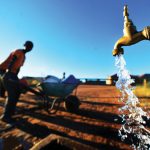Budget 2018: definitely not business friendly

While the 2018 Budget was reasonably sound, it didn’t do nearly enough to promote economic growth in South Africa, writes CHARLEEN CLARKE.
Econometrix has been holding its annual budget conference for a whopping 33 years (for the last three years, it’s been partnering with Grant Thornton and GTC). The event always provides expert commentary on the budget and its implications for the country as a whole. This year was no different; the speakers provided expert insight into the budget and what it means for each and every South African.
If there was one message that could be taken away from this year’s event, it was this: much more is needed to promote economic growth. Over and over again, the speakers bemoaned the high corporate tax rate, saying that it simply doesn’t encourage investment.
“A lot of other countries offer a better corporate tax rate than 28 percent,” noted Eugene du Plessis, partner and head: tax, at Grant Thornton. “Yes, we have special economic zones, but they need to go further in terms of offering benefits. We need to be more user friendly if we want to get an investment uptake,” he stressed.
Azar Jammine, director and chief economist at Econometrix, agreed. “We must encourage investment. Instead of investing, South African companies are sitting on large sums of cash. This is not unique to South Africa; it’s a global phenomenon.
“There has been no marked increase in the number of days in which South African businesses have taken to pay off their debts … despite the economic downturn. I attribute this to companies sitting on cash and not deploying it,” he pointed out.
Somadoda Fikeni, a leading political commentator, said: “The South African government has been trying to create an environment conducive to investment, but nothing is coming. We are seeing this all around the world. It’s a wave of anti-establishment that has brought the likes of Donald Trump into power,” he noted.
Clive Eggers, head: investment analytics at GTC, pointed out that South Africa is becoming a more investment-friendly environment. “Many businesses were sitting on potential investments and they were waiting to see what happened in December. There is now positive sentiment. We have seen turnaround in bond yields reflecting this,” he noted.
However, positive sentiment isn’t really enough to propel the country forward and, as Jammine noted, the budget should have focused more on South Africa and less on the upcoming elections.
“The budget clearly had the 2019 election in sight – hence the rollout of free tertiary education for poorer households, the absence in a reduction in the growth of public sector remuneration, the above-inflation increase in social grants, the sharp increase in the Road Accident Fund levy and the tax burden on higher income groups. Alas, the budget did little to lift sustainable growth,” he pointed out.
Du Plessis agreed. “The corporate tax rate in South Africa is 28 percent. In other BRICS countries, it’s 26 percent on average. In Organisation for Economic Co-operation and Development (OECD) countries, it is 23,88 percent on average. In the European Union (EU), it’s 21,9 percent on average. Globally, it’s 23,97 percent,” he pointed out.
Personal tax rates are equally out of kilter. “While the maximum personal taxation rate in South Africa is 45 percent, it is 32,02 percent in Africa, 38,85 percent in BRICS countries, 41,96 percent in OECD countries, 38,24 percent in EU countries and 31,52 percent globally,” Du Plessis noted.
Going forward, Jammine warned that the country – and its new president – face many tough challenges. “Ramaphosa has a huge challenge; he needs to restrict government spending by limiting the growth in public servant remuneration (in opposition to Cosatu).
“The VAT rate has been raised in order to reduce the budget deficit – thereby warding off Moody’s credit rating downgrade to junk, but there are numerous challenges that come with this increase. Then there is the issue of free tertiary education for the poor. How can this be financed without jeopardising other areas of expenditure?
“Another big issue is that of land expropriation: how will our new president achieve expropriation without compensation while avoiding the destruction of food security? The challenge is that he has to focus on domestic politics, which could obscure the importance of the global environment,” he warned.
It’s clear that Budget 2018, while reasonably sound and prudent, has left the captains of industry with more questions than answers. As Fikeni said: “Don’t make the mistake of thinking that this is a honeymoon period for our country. We are entering a period of difficult times.” Let’s hope he’s wrong.
AA speaks out
The Automobile Association isn’t enchanted with the budget, because road users – including transport operators – will be hard hit.
“The 52 cents per litre increase in the general fuel and Road Accident Fund (RAF) levies announced by (former) Finance Minister Malusi Gigaba are cause for great concern. The increases amount to a total increase of 11 percent on the current levies from R4,78 to R5,30.
“The minister announced the general fuel levy will increase by 22 cents from R3,15 to R3,37 (a seven percent increase), and the RAF levy will increase by 30 cents from R1,63 to R1,93 (an 18 percent increase).
“In January, we urged government to be careful in determining future hikes to the levies, and to consider the impact the increases have on especially the poorest of the poor in the country. At the time we also argued that any increases should be in line with inflation, which, we note today, is at its lowest since March 2015 at 4,4 percent. Instead, the increases are sizable and more than double current inflation,” it warns.
They said it
“The 2018 Budget didn’t pay enough attention to education. Of the 1,2-million jobs created in South Africa over the past decade, one million were taken up by people over the age of 34. Something is radically wrong.”
Azar Jammine
“Opposition parties have singlehandedly focused on Zuma and corruption. It was a gift that kept on giving, but what now?”
Somadoda Fikeni
“The rand is now fair to overvalued. With the relaxation of exchange controls, it’s a good time to invest overseas.”
Clive Eggers
“A four-letter word called Zuma contributed to the underperformance of the South African economy.”
Azar Jammine
“South Africa needs to lower corporate tax to stimulate investment. Globally, we are lagging behind in this regard. We need to follow Ireland’s example.”
Eugene du Plessis
“In South Africa, 1,9 percent of the population pays 67 percent of all tax. This is a warped situation; you cannot keep hammering upper income groups. They will stop working or leave!”
Azar Jammine
“South Africa still has a low VAT rate. It is
21 percent in Argentina and 20 percent in the United Kingdom.”
Clive Eggers
“Gigaba says South Africa will return to investment grade in two years. That’s hogwash!”
Azar Jammine
“Education is essential. Half of the students who start school don’t finish it. Free university education was pandering to the need of university students. This is not a solution to our country’s woes.”
Azar Jammine
Published by
Charleen Clarke
focusmagsa




